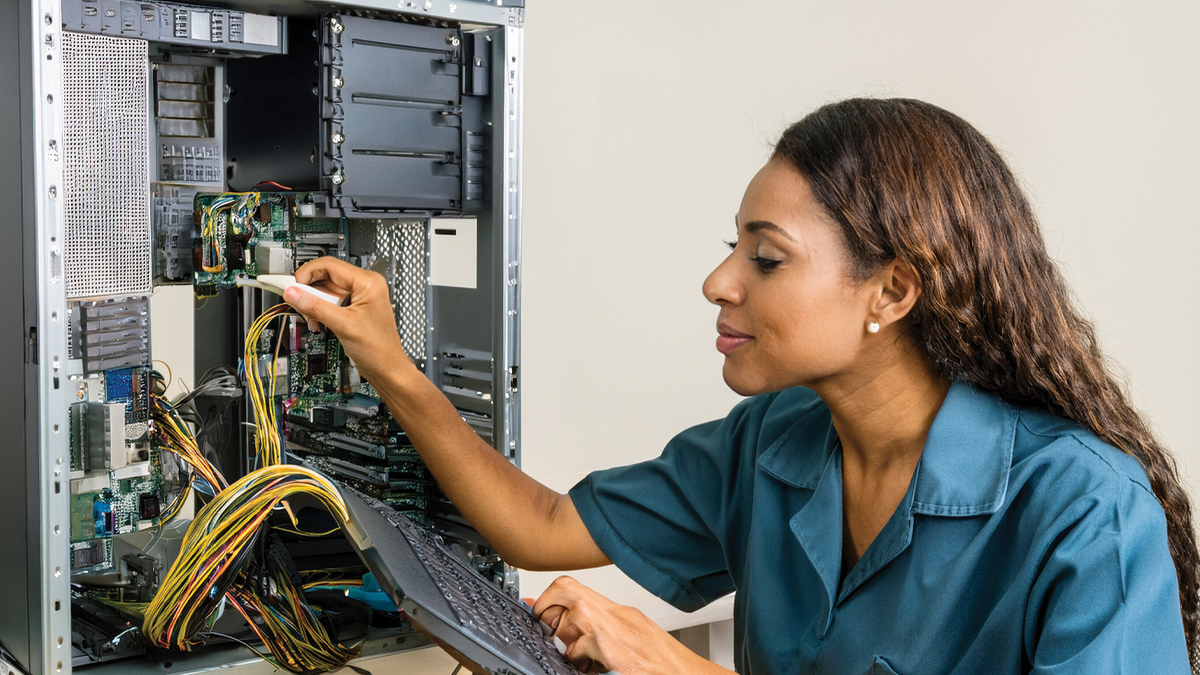When working on home improvement projects, having the right repair tools can make all the difference in achieving professional results.
In today’s tech-driven world, computers are essential in our personal and work lives. Because of this, the need for skilled computer repair technicians is growing. Having the right tools is vital to making good repairs. You might be fixing a broken desktop. You could also upgrade hardware or solve software problems. Below is a comprehensive list of essential repair tools every computer repair technician should have.
Basic Hand Repair Tools
A computer repair technician needs a toolkit with basic hand tools. These tools are essential for putting together and taking apart different computer parts
-
- Screwdriver Set: A magnetic screwdriver set with Phillips and flat-head screwdrivers in various sizes is indispensable. Additionally, a precision screwdriver set for smaller components is beneficial, mainly when working with laptops.
- Pliers: Needle-nose pliers and wire cutters assist in gripping small parts and cutting wires when necessary.
-
- Tweezers: Useful for handling small screws, jumpers, or any tiny components that are difficult to grasp.
-
- Spudgers: These plastic tools help pry open computer cases without damaging the materials.
Diagnostic Tools
Troubleshooting issues requires the right diagnostic tools to quickly identify and resolve problems:
-
- Multimeter: This versatile device measures voltage, current, and resistance, making it invaluable for diagnosing electrical issues.
- POST Card: A power-on self-test (POST) card can be put into a motherboard. It helps find hardware problems when a computer won’t start.
Cleaning Supplies
A clean computer runs more efficiently and lasts longer; therefore, technicians should equip themselves with cleaning supplies:
-
- Compressed Air: Helps blow dust out of tight spaces and cooling fans, which can improve airflow and decrease overheating issues.
- Microfiber Cloths: Ideal for cleaning screens without scratching them, as well as wiping down hardware surfaces.
-
- Isopropyl Alcohol: Useful for cleaning circuit boards and connectors; it evaporates quickly and doesn’t leave residue.
-
- Thermal Paste: Essential for ensuring proper heat transfer between the CPU and its cooler. Reapplication may be required during repairs.
Software Tools
Alongside hardware tools, software tools help diagnose and repair systems. Technicians should have:
-
- Operating System Reinstallation Media:
A USB or DVD can hold different operating systems, such as Windows or Linux. This media helps with quick installations or repairs.
- Antivirus and Malware Removal Tools:
Having a good set of antivirus and malware removal tools is important. They help prevent and remove infections.
- Operating System Reinstallation Media:
-
- Data Recovery Software: If you lose data, good recovery tools can help save important files. This builds trust in your repair services.
-
- System Benchmarking Tools: These utilities help assess the performance and stability of hardware components, which can aid in troubleshooting.
Specialized Tools
Depending on the scope of the repair work, technicians may require specialized tools:
-
- Cable Tester: Important for diagnosing issues in networking cables, ensuring proper connectivity.
- Laptop Repair Tools: Special tools for laptops, like a laptop opening tool kit, are essential for reaching tightly sealed parts.
-
- Hard Drive Cloning Equipment: A cloning station is useful when you need to move data from an old hard drive to a new one.
Workstation Essentials
Lastly, having an organized workstation improves efficiency in repairs:
-
- Anti-Static Wrist Strap: Technicians should wear an anti-static wrist strap. This helps reduce static electricity. Static can harm sensitive parts while working on systems.
- Magnifying Lamp: A lamp with a magnifying glass is useful for closely examining tiny components and solder joints.
-
- Tool Organizer: An organized toolbox or workstation can save time by ensuring readily accessible tools.
Conclusion
Becoming a skilled computer repair technician requires more than just knowledge and experience. You also need the right tools, both basic and specialized. You will be ready to handle many tasks by using the essential tools listed above. These tasks can range from simple upgrades to more complex troubleshooting. As technology changes, staying updated with new tools and methods will help you stay competitive.


